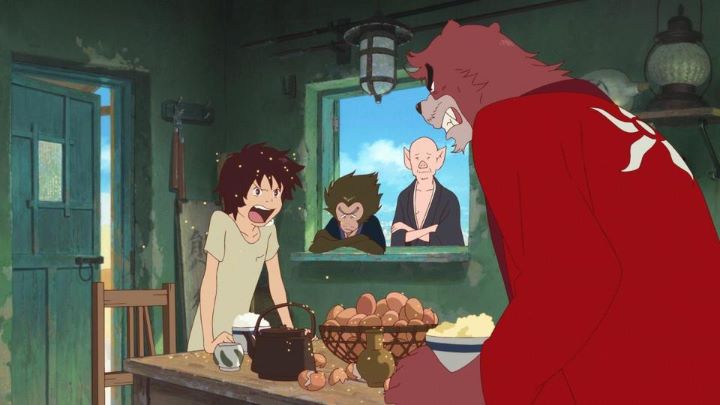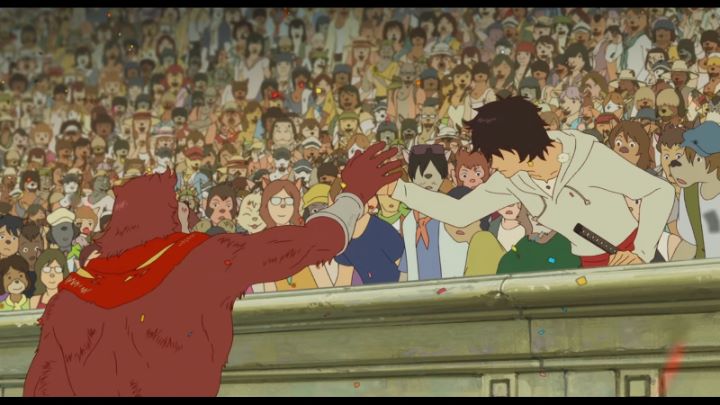








By 2015, Mamoru Hosoda had effectively positioned himself as Japan's strongest director in animation. Hayao Miyazaki, the global master, had retired only recently, with the famed Studio Ghibli officially disbanding for the first time without a leader to guide them. There were few other anime directors the average viewer would recognize by name. But by this point, Hosoda already had three critically acclaimed films under his belt, enough to be encouraged to found his own studio to produce these at a regular pace. They were touching films about family bonds, suitable for audiences of all ages. And 2015's "The Boy and the Besat," the first film entirely made within Hosoda's Studio Chizu, would not only be licensed by Funimation in the United States, but also by Mongrel Media in Canada. It is incredibly rare for a license to be split within North America, only speaking further to the fame Hosoda had by this point. Thankfully, unlike some past releases, Mongrel's Bluray was nearly identical to Funimation's in every way, containing the same English and Japanese dubs, making me less annoyed that Funimation's Bluray was literally and legally blocked from all Canadian stores and websites. But as well regarded as Hosoda's name became, it also became clear by now, in his fourth film, that he tended to stick to the same type of themes. Themes regarding family and individual relationships of love between them, often told across several years. When seen individually, "The Boy and the Beast" is still a fantastic film in this regard, but when seen as part of his portfolio, it seems slightly repetitive. Many critics also noticed it was the first time Hosoda wrote the screenplay alone: previously, he long worked with Satoko Okudera, a female voice that helped ground him and organize his ideas. In comparison, "The Boy and the Beast" seems a little too grand for its own good. Exactly why Okudera didn't return isn't clear, but perhaps Hosoda felt more personal to this new movie for its theme of fatherhood and growing up, a more specifically male perspective compared to his previous films.Indeed, if "Wolf Children" was a tale of motherhood, "The Boy and the Beast" is a tale of fatherhood. It starts with the perspective of Ren, a young boy quietly in the background after his mother passes away. With his father missing years prior, and her mother's death never explained, all we need to know is that Ren's relatives struggle to know what to do with him, and Ren ultimately runs away instead of agreeing to live with any of them. Alone on the streets of Tokyo, a strange pair of hooded hairy men come across him, one of whom offers Ren to be his apprentice in passing. Taking their leave, Ren follows them down allyways until reaching the secret Beast Kingdom, a parallel world unknown to the humans.The Beast Kingdom is much more fantastical than anything Hosoda has portrayed in his movies, and is arguably its biggest strength. There's a grand history to it, full of its own unusual monster characters and customs. It's colourful and varied, and well-realized. It turns out the ruler of this world (an aging, wise rabbit with a sense of humour) is planning to retire, and soon there will be a great tournament to decide his successor. One of the beasts Ren had seen in Tokyo, the brash bear-like Kumatetsu, is training to win the tournament, but despite his strength, he is generally unpopular and lives alone. His most likely rival, Iozen, is more skillful and well-mannered, able to best Kumatetsu and with ongoing support by the public. As one of the clauses to participate (presumably to show compassion and leadership... yeah, it's kind of shoe-horned in), each fighter must take in a apprentice. With no where else to go, Ren agrees to live with Kumatetsu, and Kumatetsu has to learn to be a mentor and teacher to this human child. Both initially stubborn and off-putting to each other, they eventually grow to learn from each other over the course of a decade.  Yes, a decade. We see Ren grow up from a child to a teenager to a young man, training swordplay with Kumatetsu as the seasons pass, defying the odds to almost become his equal. Seeing them both grow over the passage of time is a beautiful sight. But the plot also gets a little unfocused here. At one point, the two take a "field trip" across different parts of the realm to understand the true definition of strength and power, and while the scenery is nice, it feels like it moves too quickly over the course of only a few minutes, ultimately not being necessary to the film at all. In the second half of the film, Ren rediscovers the human world and begins to long for it, and with the help of a college student he meets, he trains to re-enter school behind Kumatetsu's back. Kaede feels like a forced romantic interest, and her insistence that Ren's hardships are something that "everyone feels" and "he's not alone" feels hollow. Yes, we all hve our own personal problems, Kaede included, but somehow I don't think that compares well against Ren living most of his childhood in an alternate monster world. That this seems to be one of the biggest themes the movie wants you to take away doesn't do any favours. And did I mention the big bad villain that comes in for the final third for the sake of conflict?That's a lot of story elements, about half of which don't blend well with each other in the grand scope of things. For that, I'm tempted to say this is the weakest story of any of Hosoda's works up to this point. But it is still a pretty fantastic story. The beast world and its magic make for a great setting of action and comedy. The climax is plenty exciting, even if it is a bit predictable. When the movie wants you to laugh, you laugh. When the movie wants you to cry, you cry. In that way, the touch isn't lost: "The Boy and the Beast" is still a pretty incredible adventure. The strong voice acting and musical score from the very beginning make it clear that Hosoda has a confidence in his work that will no doubt continue to make him a beacon of family stories enjoyed around the world. But he does need to start thinking outside the box with his themes... after 2015, a slew of promising anime films began to be more commonplace, so he'll have a lot of stiff competition.
Yes, a decade. We see Ren grow up from a child to a teenager to a young man, training swordplay with Kumatetsu as the seasons pass, defying the odds to almost become his equal. Seeing them both grow over the passage of time is a beautiful sight. But the plot also gets a little unfocused here. At one point, the two take a "field trip" across different parts of the realm to understand the true definition of strength and power, and while the scenery is nice, it feels like it moves too quickly over the course of only a few minutes, ultimately not being necessary to the film at all. In the second half of the film, Ren rediscovers the human world and begins to long for it, and with the help of a college student he meets, he trains to re-enter school behind Kumatetsu's back. Kaede feels like a forced romantic interest, and her insistence that Ren's hardships are something that "everyone feels" and "he's not alone" feels hollow. Yes, we all hve our own personal problems, Kaede included, but somehow I don't think that compares well against Ren living most of his childhood in an alternate monster world. That this seems to be one of the biggest themes the movie wants you to take away doesn't do any favours. And did I mention the big bad villain that comes in for the final third for the sake of conflict?That's a lot of story elements, about half of which don't blend well with each other in the grand scope of things. For that, I'm tempted to say this is the weakest story of any of Hosoda's works up to this point. But it is still a pretty fantastic story. The beast world and its magic make for a great setting of action and comedy. The climax is plenty exciting, even if it is a bit predictable. When the movie wants you to laugh, you laugh. When the movie wants you to cry, you cry. In that way, the touch isn't lost: "The Boy and the Beast" is still a pretty incredible adventure. The strong voice acting and musical score from the very beginning make it clear that Hosoda has a confidence in his work that will no doubt continue to make him a beacon of family stories enjoyed around the world. But he does need to start thinking outside the box with his themes... after 2015, a slew of promising anime films began to be more commonplace, so he'll have a lot of stiff competition.